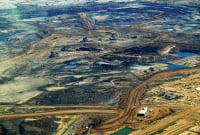About a year ago, a group of University of Toronto law students wanted to uncover how Canadian law firms were perpetuating the climate crisis and what they found was shocking. Five of the largest Canadian firms notched more than a trillion dollars worth of energy deals since 2008.
Law firms have not received nearly as much attention as the oil and gas companies, banks, insurance companies and other corporations that prop up the fossil fuel sector, but are still deserving of attention, says Hannah West, one of the students behind a report outlining the findings.
“They might be facilitators rather than people actually building the pipelines, drilling the oil wells, etc., but they 100 per cent are complicit in exacerbating the climate crisis and we shouldn't let them off the hook anymore,” she told Canada’s National Observer.
Harrison Myles, one of the students behind the discovery, said after conversations with people in the climate justice community it seemed as if there was a gap in understanding how Canadian law firms contribute to the climate crisis that was worth addressing.
“A lot of the time, law firms operate very much under the radar,” Myles said. “Rarely does it draw the attention of the average person, and I think that's true especially for law students who may not realize the extent to which certain firms they could be applying for, and working for, are involved in the climate crisis by facilitating all these oil, gas and coal deals and transactions.
“We felt like as a major contributor to global carbon emissions, the Canadian industry needed to also be exposed like the American one and to be clear that Canada is no better than any other country like the United States or [the] U.K. when it comes to facilitating and protecting energy companies,” he added.

The report, inspired by a similar effort in the United States developed by Law Students for Climate Accountability, spells out how the law is used to secure contracts to extract oil and facilitate financial transactions on behalf of fossil fuel companies, as well as used to remove Indigenous land defenders from their territory while fighting pipeline construction.
Wanting to shine a spotlight on the role of law firms driving the climate crisis is a stated goal of the report, along with providing transparency to allow students to make informed decisions about where they work and pressuring firms to change how they do business.
“We have no lofty illusions that this report alone will pressure a massive firm into abandoning their fossil fuel clients, many of whom likely contribute millions of dollars to a firm’s profit margins,” the students wrote in the report. “That being said, this report is only the beginning.”
Students from the University of Toronto Law Union began combing through self-reported data from the law firms of Torys LLP, Fasken, McCarthy Tétrault LLP, Miller Thomson LLP, and Osler, Hoskin & Harcourt LLP from 2008 to February 2023 looking for energy-related transactions. The firms were chosen based on availability of data, number of students hired, number of lawyers on the payroll, and “homegrown” in Canada (to rule out major international law firms with operations in Canada).
McCarthy Tétrault was found to have the highest number of fossil fuel transactions at 308, totalling $208 billion over 15 years. Meanwhile, Torys reported more renewable energy transactions over the same period than any other firm with a total value of $45 billion across 171 deals.
All five firms examined have deep fossil fuel connections:
- McCarthy Tétrault’s largest fossil fuel deal was facilitating Enbridge’s acquisition of Spectra Energy at a total of $37 billion.
- Torys had $157 billion worth of fossil fuel deals, including helping Enbridge acquire Woodfibre LNG and working as counsel for the federal government on the Trans Mountain pipeline expansion project.
- Fasken self-reported $36 billion worth of fossil fuel deals and was the firm that helped Coastal GasLink secure an injunction against Wet’suwet’en land defenders attempting to block construction of the pipeline through their unceded territory.
- Osler, Hoskin & Harcourt racked up $126 billion worth of oil and gas deals, with its largest deal being the amalgamation of Husky Energy and Cenovus. The firm also advised BP on a class action lawsuit stemming from alleged misrepresentation relating to the Deepwater Horizon oil rig explosion in 2010.
- Miller Thomson was found to have the fewest number of self-reported fossil fuel deals, and those publicized deals did not always contain dollar figures. The firm is “emblematic of the limitations” of data collection, according to the report. Nonetheless, students were able to track $232.5 million worth of fossil fuel deals across six transactions.
Myles said the University of Toronto has a reputation for being very corporate-law friendly, with just about every room, stairwell and bench named after a corporate law firm donor. “So there's a tremendous amount of pressure for students to go into that area, and part of that is because of the tremendous amount of debt that is accumulated going to U of T, which has the highest tuition out of any Canadian law school,” he said. That pipeline that transports students from classroom to corporate firm where fossil fuel extraction will be perpetuated is one of the issues that needs to be fixed, he says.
“Every single cog in the machine that allows the fossil fuel industry to exist needs to be addressed, needs to be exposed, and I think that also relates to individuals,” he said. “Every individual is a cog in the machine that exists in a law firm, and every time one of those cogs breaks down, [it] can create some trouble for the machine. And if enough of them break down, then suddenly the machine stops working.”






Comments
Unless one truly believes the inferences of a favourite lawyer joke, I can't help but think that this occupation-specific hand-wringing is missing the point, thereby distracting from the actual problem, in my opinion (IMO): policy and, even more fundamentally, the mythological economic underpinnings of the status quo.
Lawyers are involved in every facet of the economy, and Canada's economy is to a significant degree dependent upon economic activity which by its very nature worsens the crises which are degrading the viability of the biosphere as we know it; climate is just one concern. If law students target law firms engaged by fossil players, then, I think, for consistency, they ought to be targeting lawyers engaged by forest products players, mining players, fisheries players, construction players, etc.
IMO, in addition to identifying lawyers enabling destructive industries (I'd think of that as tactical), U of T law students may also wish to spotlight lawyers engaged in lobbying for policies that are foreseeably detrimental to the continuance of, say, democracy and the biosphere (more strategic). Conversely, they may wish to praise lawyers who are actively lobbying for policies that would seek to strengthen the human condition in society and regenerate the biosphere as we know it. Maybe even promote awareness of lawyers actively working the courts, using current law and legislation to the same ends (e.g. Ecojustice, West Coast Environmental Law -- to name two that come to mind).
Following from these thoughts, I was a little surprised to read the word "shocking" in the lede. It's no more shocking than banks lending money to companies that are likely to be profitable for the foreseeable future due to policy choices, to date; it's simply business as usual.
Iron Rings (symbolic of ethical oaths, one presumes, sworn by Canadian engineering graduates) notwithstanding, engineering professions are, I should think, at least as culpable as lawyers in facilitating the destruction of the biosphere as we know it. Plenty of blame to go around, and -- because engineers and lawyers have many others ways to keep busy outside of extraction -- another reason why I think picking on particular professions might be missing the target.
Legislatures beget policy -> legislatures are populated by policymakers -> policymakers are you and I, elected. If we are to change policy, enough people, holding to a belief in the need for regeneration and its requisite policy supports, need to run for office, be elected, and serve. Does the entirety of the current crop of legislators represent the best that our society has produced?
Target the Professional Engineers. They are the ones building the fossil fuel infrastructure. They could say no, but have so far rejected attempts to persuade them to do so in B.C.
Nice commentary.
Perhaps it would be best if we had the most skilled and most ethical engineers building fossil fuel infra structure rather than those that are deaf to such arguments?
Picking on lawyers, who are disproportionately represented in our legislatures as MPs and MLAs, and many of whom end up running our justice system, seems to be right on target if we want to get the right kind of legislation drafted and passed, followed by the right kind of interpretations necessary to preserving both the biosphere and some form of post-oil human civilization.